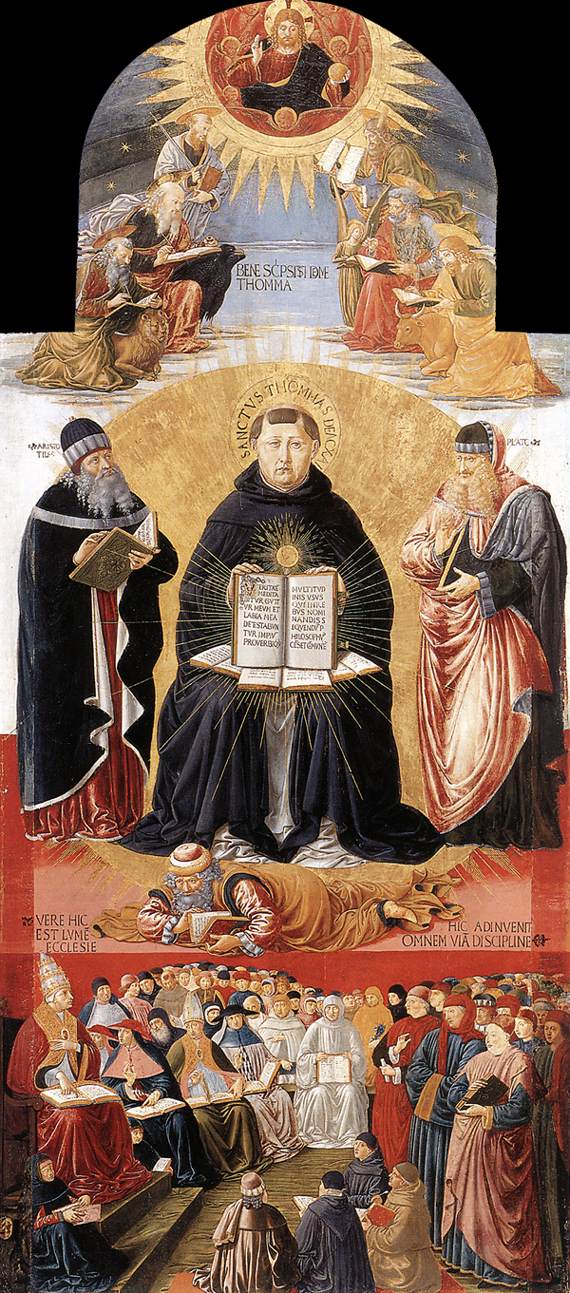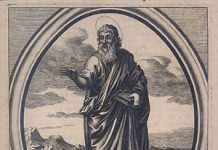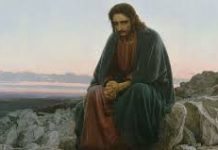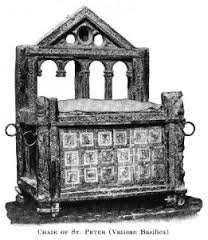
BENEDICT XVI
GENERAL AUDIENCE
Saint Peter’s Square
Wednesday, 2 June 2010
Saint Thomas Aquinas (1)
Dear Brothers and Sisters,
After several Catecheses on the priesthood and on my latest Journeys, today we return to our main theme: meditation on some of the great thinkers of the Middle Ages. We recently looked at the great figure of St Bonaventure, a Franciscan, and today I wish to speak of the one whom the Church calls the Doctor communis namely, St Thomas Aquinas. in his Encyclical Fides et Ratio my venerable Predecessor, Pope John Paul II, recalled that “the Church has been justified in consistently proposing St Thomas as a master of thought and a model of the right way to do theology” (n. 43). It is not surprising that, after St Augustine, among the ecclesiastical writers mentioned in the Catechism of the Catholic Church St Thomas is cited more than any other, at least 61 times! He was also called the Doctor Angelicus, perhaps because of his virtues and, in particular, the sublimity of his thought and the purity of his life.
Thomas was born between 1224 and 1225 in the castle that his wealthy noble family owned at Roccasecca near Aquino, not far from the famous Abbey of Montecassino where his parents sent him to receive the first elements of his education. A few years later he moved to Naples, the capital of the Kingdom of Sicily, where Frederick II had founded a prestigious university. Here the thinking of the Greek philosopher Aristotle was taught without the limitations imposed elsewhere. The young Thomas was introduced to it and immediately perceived its great value. However, it was above all in those years that he spent in Naples that his Dominican vocation was born. Thomas was in fact attracted by the ideal of the Order recently founded by St Dominic. However, when he was clothed in the Dominican habit his family opposed this decision and he was obliged to leave the convent and spend some time at home.
In 1245, by which time he had come of age, he was able to continue on the path of his response to God’s call. He was sent to Paris to study theology under the guidance of another Saint, Albert the Great, of whom I spoke not long ago. A true and deep friendship developed between Albert and Thomas. They learned to esteem and love each other to the point that Albert even wanted his disciple to follow him to Cologne, where he had been sent by the Superiors of the Order to found a theological studium. Thomas then once again came into contact with all Aristotle’s works and his Arab commentators that Albert described and explained.
In this period the culture of the Latin world was profoundly stimulated by the encounter with Aristotle’s works that had long remained unknown. They were writings on the nature of knowledge, on the natural sciences, on metaphysics, on the soul and on ethics and were full of information and intuitions that appeared valid and convincing. All this formed an overall vision of the world that had been developed without and before Christ, and with pure reason, and seemed to impose itself on reason as “the” vision itself; accordingly seeing and knowing this philosophy had an incredible fascination for the young. Many accepted enthusiastically, indeed with a-critical enthusiasm, this enormous baggage of ancient knowledge that seemed to be able to renew culture advantageously and to open totally new horizons. Others, however, feared that Aristotle’s pagan thought might be in opposition to the Christian faith and refused to study it. Two cultures converged: the pre-Christian culture of Aristotle with its radical rationality and the classical Christian culture. Certain circles, moreover, were led to reject Aristotle by the presentation of this philosopher which had been made by the Arab commentators. Avicenna and Averroës. Indeed, it was they who had transmitted the Aristotelian philosophy to the Latin world. For example, these commentators had taught that human beings have no personal intelligence but that there is a single universal intelligence, a spiritual substance common to all, that works in all as “one”: hence, a depersonalization of man. Another disputable point passed on by the Arab commentators was that the world was eternal like God. This understandably unleashed never-ending disputes in the university and clerical worlds. Aristotelian philosophy was continuing to spread even among the populace.
(To continue reading, please see here).
*********************************************************
BENEDICT XVI
GENERAL AUDIENCE
Saint Peter’s Square
Wednesday, 16 June 2010
Saint Thomas Aquinas (2)
Dear Brothers and Sisters,
Today I would like to continue the presentation of St Thomas Aquinas, a theologian of such value that the study of his thought was explicitly recommended by the Second Vatican Council in two documents, the Decree Optatam totius on the Training of Priests, and the Declaration Gravissimum Educationis, which addresses Christian Education. Indeed, already in 1880 Pope Leo XIII, who held St Thomas in high esteem as a guide and encouraged Thomistic studies, chose to declare him Patron of Catholic Schools and Universities.
The main reason for this appreciation is not only explained by the content of his teaching but also by the method he used, especially his new synthesis and distinction between philosophy and theology. The Fathers of the Church were confronted by different philosophies of a Platonic type in which a complete vision of the world and of life was presented, including the subject of God and of religion. In comparison with these philosophies they themselves had worked out a complete vision of reality, starting with faith and using elements of Platonism to respond to the essential questions of men and women. They called this vision, based on biblical revelation and formulated with a correct Platonism in the light of faith: “our philosophy”. The word “philosophy” was not, therefore, an expression of a purely rational system and, as such, distinct from faith but rather indicated a comprehensive vision of reality, constructed in the light of faith but used and conceived of by reason; a vision that naturally exceeded the capacities proper to reason but as such also fulfilled it. For St Thomas the encounter with the pre-Christian philosophy of Aristotle (who died in about 322 b.c.) opened up a new perspective. Aristotelian philosophy was obviously a philosophy worked out without the knowledge of the Old and New Testaments, an explanation of the world without revelation through reason alone. And this consequent rationality was convincing. Thus the old form of the Fathers’ “our philosophy” no longer worked. The relationship between philosophy and theology, between faith and reason, needed to be rethought. A “philosophy” existed that was complete and convincing in itself, a rationality that preceded the faith, followed by “theology”, a form of thinking with the faith and in the faith. The pressing question was this: are the world of rationality, philosophy conceived of without Christ, and the world of faith compatible? Or are they mutually exclusive? Elements that affirmed the incompatibility of these two worlds were not lacking, but St Thomas was firmly convinced of their compatibility indeed that philosophy worked out without the knowledge of Christ was awaiting, as it were, the light of Jesus to be complete. This was the great “surprise” of St Thomas that determined the path he took as a thinker. Showing this independence of philosophy and theology and, at the same time, their reciprocal relationality was the historic mission of the great teacher. And thus it can be understood that in the 19th century, when the incompatibility of modern reason and faith was strongly declared, Pope Leo XIII pointed to St Thomas as a guide in the dialogue between them. In his theological work, St Thomas supposes and concretizes this relationality. Faith consolidates, integrates and illumines the heritage of truth that human reason acquires. The trust with which St Thomas endows these two instruments of knowledge faith and reason may be traced back to the conviction that both stem from the one source of all truth, the divine Logos, which is active in both contexts, that of Creation and that of redemption.
Together with the agreement between reason and faith, we must recognize on the other hand that they avail themselves of different cognitive procedures. Reason receives a truth by virtue of its intrinsic evidence, mediated or unmediated; faith, on the contrary, accepts a truth on the basis of the authority of the Word of God that is revealed. St Thomas writes at the beginning of his Summa Theologiae: “We must bear in mind that there are two kinds of sciences. There are some which proceed from a principle known by the natural light of the intelligence, such as arithmetic and geometry and the like. There are some which proceed from principles known by the light of a higher science: thus the science of perspective proceeds from principles established by geometry, and music from principles established by arithmetic. So it is that sacred doctrine is a science, because it proceeds from principles established by the light of a higher science, namely, the science of God and the blessed” (ia, q. 1, a.2).
This distinction guarantees the autonomy of both the human and the theological sciences. However, it is not equivalent to separation but, rather, implies a reciprocal and advantageous collaboration. Faith, in fact, protects reason from any temptation to distrust its own abilities, stimulates it to be open to ever broader horizons, keeps alive in it the search for foundations and, when reason itself is applied to the supernatural sphere of the relationship between God and man, faith enriches his work. According to St Thomas, for example, human reason can certainly reach the affirmation of the existence of one God, but only faith, which receives the divine Revelation, is able to draw from the mystery of the Love of the Triune God.
Moreover, it is not only faith that helps reason. Reason too, with its own means can do something important for faith, making it a threefold service which St Thomas sums up in the preface to his commentary on the De Trinitate of Boethius: “demonstrating those truths that are preambles of the faith; giving a clearer notion, by certain similitudes, of the truths of the faith; resisting those who speak against the faith, either by showing that their statements are false, or by showing that they are not necessarily true” (q. 2, a.3). The entire history of theology is basically the exercise of this task of the mind which shows the intelligibility of faith, its articulation and inner harmony, its reasonableness and its ability to further human good. The correctness of theological reasoning and its real cognitive meaning is based on the value of theological language which, in St Thomas’ opinion, is principally an analogical language. The distance between God, the Creator, and the being of his creatures is infinite; dissimilitude is ever greater than similitude (cf. DS 806). Nevertheless in the whole difference between Creator and creatures an analogy exists between the created being and the being of the Creator, which enables us to speak about God with human words.
St Thomas not only based the doctrine of analogy on exquisitely philosophical argumentation but also on the fact that with the Revelation God himself spoke to us and therefore authorized us to speak of him. I consider it important to recall this doctrine. In fact, it helps us get the better of certain objections of contemporary atheism which denies that religious language is provided with an objective meaning and instead maintains that it has solely a subjective or merely emotional value. This objection derives from the fact that positivist thought is convinced that man does not know being but solely the functions of reality that can be experienced. With St Thomas and with the great philosophical tradition we are convinced that, in reality, man does not only know the functions, the object of the natural sciences, but also knows something of being itself for example, he knows the person, the You of the other, and not only the physical and biological aspect of his being.
(To continue reading, please see here).
*********************************************************
BENEDICT XVI
GENERAL AUDIENCE
Paul VI Hall
Wednesday, 23 June 2010
Saint Thomas Aquinas (3)
Dear Brothers and Sisters,
Today I would like to complete, with a third instalment, my Catecheses on St Thomas Aquinas. Even more than 700 years after his death we can learn much from him. My Predecessor, Pope Paul VI, also said this, in a Discourse he gave at Fossanova on 14 September 1974 on the occasion of the seventh centenary of St Thomas’ death. He asked himself: “Thomas, our Teacher, what lesson can you give us?”. And he answered with these words: “trust in the truth of Catholic religious thought, as defended, expounded and offered by him to the capacities of the human mind” (Address in honour of St Thomas Aquinas in the Basilica, 14 September 1974; L’Osservatore Romano English edition, [ore], 26 September 1974, p. 4). In Aquino moreover, on that same day, again with reference to St Thomas, Paul VI said, “all of us who are faithful sons and daughters of the Church can and must be his disciples, at least to some extent!” (Address to people in the Square at Aquino, 14 September 1974; ORE, p. 5).
Let us too, therefore, learn from the teaching of St Thomas and from his masterpiece, the Summa Theologiae. It was left unfinished, yet it is a monumental work: it contains 512 questions and 2,669 articles. It consists of concentrated reasoning in which the human mind is applied to the mysteries of faith, with clarity and depth to the mysteries of faith, alternating questions with answers in which St Thomas deepens the teaching that comes from Sacred Scripture and from the Fathers of the Church, especially St Augustine. In this reflection, in meeting the true questions of his time, that are also often our own questions, St Thomas, also by employing the method and thought of the ancient philosophers, and of Aristotle in particular, thus arrives at precise, lucid and pertinent formulations of the truths of faith in which truth is a gift of faith, shines out and becomes accessible to us, for our reflection. However, this effort of the human mind Aquinas reminds us with his own life is always illumined by prayer, by the light that comes from on high. Only those who live with God and with his mysteries can also understand what they say to us.
In the Summa of theology, St Thomas starts from the fact that God has three different ways of being and existing: God exists in himself, he is the beginning and end of all things, which is why all creatures proceed from him and depend on him: then God is present through his Grace in the life and activity of the Christian, of the saints; lastly, God is present in an altogether special way in the Person of Christ, here truly united to the man Jesus, and active in the Sacraments that derive from his work of redemption. Therefore, the structure of this monumental work (cf. Jean-Pierre Torrell, La “Summa” di San Tommaso, Milan 2003, pp. 29-75), a quest with “a theological vision” for the fullness of God (cf. Summa Theologiae, Ia q. 1, a. 7), is divided into three parts and is illustrated by the Doctor Communis himself St Thomas with these words: “Because the chief aim of sacred doctrine is to teach the knowledge of God, not only as he is in himself, but also as he is the beginning of things and their last end, and especially of rational creatures, as is clear from what has already been said, therefore, we shall treat: (1) Of God; (2) Of the rational creature’s advance towards God; (3) Of Christ, Who as man, is our way to God” (ibid.,I, q. 2). It is a circle: God in himself, who comes out of himself and takes us by the hand, in such a way that with Christ we return to God, we are united to God, and God will be all things to all people.
The First Part of the Summa Theologiae thus investigates God in himself, the mystery of the Trinity and of the creative activity of God. In this part we also find a profound reflection on the authentic reality of the human being, inasmuch as he has emerged from the creative hands of God as the fruit of his love. On the one hand we are dependent created beings, we do not come from ourselves; yet, on the other, we have a true autonomy so that we are not only something apparent as certain Platonic philosophers say but a reality desired by God as such and possessing an inherent value.
(To continue reading, please see here).











